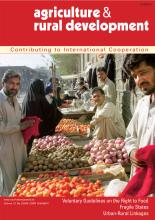Land Library
Welcome to the Land Portal Library. Explore our vast collection of open-access resources (over 74,000) including reports, journal articles, research papers, peer-reviewed publications, legal documents, videos and much more.
/ library resources
Showing items 289 through 297 of 314.Post-tsunami reconstruction has been under way in the Indonesian province of Aceh for nearly two years. In the authors' view, swift coordination of goals and instruments has enabled positive synergies to be created between short-term development-oriented emergency aid and long-term recovery.
People-centred early warning systems empower communities to prepare for and confront the power of natural hazards.
The series of dramatic natural events is never ending. 2005 again illustrated that natural disasters are unavoidable. For disaster prevention systems to function properly, investments in raising risk awareness are key.
Rural areas are not exempted from the impacts of globalisation. Global trends affecting agriculture are particularly significant in this respect. A number of options are available to developing countries in responding to these trends.
Two images have dominated the northern media in recent months.The first is of desolation in remote, rural areas in Africa affected by drought, conflict or famine, such as in Somalia, northern Kenya or Darfur, Sudan.
The rural areas of the South have undergone vital socio-economic and technological changes marked by globalisation, economic liberalization and political decentralization and by the information and communication sector.
More than 70 percent of the world's poor live in rural areas.The World Bank's approach to rural development is holistic and multisectoral, focused on improving the wellbeing of rural people by building their productive, social, and environmental assets.
Few aspects of development policy are better furnished with empirical evidence than the interplay between support for agriculture in the context of rural development and the reduction of poverty and hunger.
In November 2004, after a two-year drafting process, the FAO Council adopted the Voluntary Guidelines on the right to food - in effect, a new legal instrument for defending and enforcing the right to food.This article addresses the following questions:


